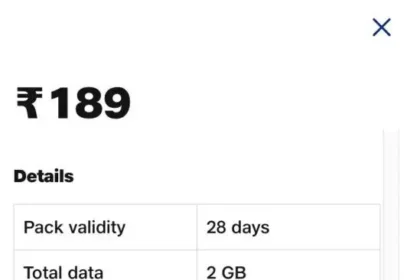Introduction
When Reliance Jio entered India’s telecom market in 2016, no one anticipated that one brand would democratize data the way it did. Jio made 1GB of data a necessity of everyday life. Overnight, millions of Indians, from urban metros to rural villages, were watching videos, taking online classes, video calling, and conducting business on their phones—all this, frequently at a cost lower than a day’s cup of tea.
But Jio’s vision was never simply about affordable data. It was about digital empowerment, and that vision keeps unfolding.
Today, as India moves towards a 5G future, the next digital jump is already in progress: the adoption of eSIM technology. With no physical chip, port, or manual insertion, eSIMs provide a more intelligent, secure, and effortless way to remain connected. And Jio — faithful to its disruptive spirit — has simplified eSIM activation even for the first-timer. The success of the first Jio Phone Next — a hyper-low-cost Android smartphone co-developed with Google — has created anticipation around its sequel. Will it have improved specs? A larger screen? Even 5G? Rumours are rampant, and expectations are building quickly, particularly among those seeking a first smartphone that does not cut corners on features.

This piece will walk you through, step by step, how to turn on your Jio eSIM, and then touch on the news, specs, and hype surrounding the imminent launch of the Jio Phone Next 2 — all in one place.
What is eSIM & Why It Matters
In an age where everything is becoming digital — from payments to passports — even your mobile SIM is playing catch-up. Meet the eSIM, or Embedded SIM — a revolution in mobile connectivity.
eSIM vs. Physical SIM: What’s the Difference?
A physical SIM is the tiny plastic chip you put into your phone to link to your mobile network. It holds your mobile number, network ID, and simple data for communication. But it has physical constraints: you can misplace it, break it, or require a pin to take it out each time you change devices.
An eSIM, however, is integrated into your phone’s motherboard. It does the same thing but without requiring a card. You can remotely activate it with a QR code or app, and change networks or plans without touching the SIM tray.
It’s not only a new tech fad — it’s the future of digital transformation.
Key Benefits at a Glance
- Safer Than a Physical SIM
- Because there’s no removable card, eSIMs can’t be physically stolen, lost, or cloned.
- Perfect for heavy travellers or people worried about phone robbery.
- The Best for Dual SIM Users
- Dual SIM (1 eSIM + 1 physical SIM) is supported by most modern smartphones.
- You can utilize two numbers simultaneously — e.g., one for work and one for personal — without carrying two devices.
- No SIM Slot? No Problem.
- Phones can now be smaller or waterproof because manufacturers do not require a physical SIM tray.
- Future smartphones, smartwatches, tablets, and even Internet of Things devices will go slotless, driven solely by eSIMs.
- Easy Switching Between Carriers
- You can change plans or operators without waiting for a new SIM card.
- Going abroad? Scan a local eSIM QR code and you’re connected — no roaming horror stories.
- Eco-Friendly
Less plastic = less waste. Going digital with eSIMs contributes to a greener tech ecosystem.
Check if Your Phone Supports eSIM (Android & iPhone)
Before jumping into the world of eSIM, the first thing is straightforward but crucial:
Is your phone eSIM-compatible? Not all phones — particularly low-end or older ones — are equipped with this technology. Let’s discover how to verify.
Step 1: Verify EID & IMEI
To validate if your phone is eSIM-compatible, an EID (Embedded Identity Document) and the normal IMEI number need to be displayed. Here’s the process:
- Open the dialer on your phone.
- Dial *#06# and click on the call button.
- A screen will appear with:
- IMEI1 & IMEI2 (for Dual SIM phones)
- EID (only if eSIM supported)
- If EID is apparent → Congratulations! Your phone supports eSIM.
- No EID? Then your device is not eSIM-enabled.
- Android Phones (eSIM Supported)
- Google Pixel Series
- Pixel 4, 4a, 4a 5G, 5, 6, 6a, 7, 7a, 8, 8a, 8 Pro
- Samsung Galaxy Series
- Galaxy S24, S23, S22, S21, S20 series
- Galaxy Z Flip (3, 4, 5), Z Fold (3, 4, 5)
- Galaxy Note 20, Note 20 Ultra
- Galaxy A54 (2023), A74 (2024)** (only selected variants)
- Motorola & Others
- Motorola Razr (2022, 2023)
- Oppo Find X3, X5 Pro
- Vivo X90 Pro+
- Xiaomi 13 series (Global variants with eSIM support)
- Tip: Always confirm with the maker if your version supports eSIM, particularly for Chinese/import versions.
If your phone displays an EID and is listed here, you’re all set to activate Jio eSIM. That way, it will set up smoothly and activate quickly if it doesn’t, consider updating, particularly with Jio Phone Next 2 on the horizon (and who knows, it could support eSIM as well!).
SMS-Based Activation: The Step-by-Step Jio Magic
io has made it extremely easy to activate an eSIM on your phone, without stepping out of the house or standing in long lines. If you’re a regular flyer, a minimalistic tech enthusiast, or just someone fed up with juggling tiny SIM cards, this is how you can activate your Jio eSIM over SMS — from the comfort of your home.
Step One: Send the eSIM Request via SMS
Ensure you’re sending the SMS from your current Jio number, which you want to port to eSIM.
If you miss the call or enter the wrong number, the request will be cancelled, and you will have to begin again from Step 1.
Get the eSIM QR Code through Email/SMS
After your verification is successful, you’ll be provided with your eSIM activation information through:
SMS (in the form of a profile link), and/or
Your registered email address (typically with a QR code)
It can take 2 hours, though the QR code reaches most users within 15–30 minutes.
Do not refresh or delete the mail or SMS — the QR code is only valid once.
What You’ll Need Before Scanning:
- A stable internet connection
- Access to the email/phone on which the QR was received
- Make sure the battery of the phone is more than 50%
- Once you have the QR code, you’re prepared for the last step: scanning and activating the eSIM on your Android or iPhone device, which we’ll address in the next section.
Add eSIM on Your Device (UI Walkthrough)
After you have your Jio eSIM QR code via email or SMS, it is time to activate the eSIM on your device. Easy peasy, this process requires no SIM insertion or phone rebooting several times.
All you need to do is follow these steps, depending on whether you have an Android or an iPhone.
For Android Users: Step-by-Step Guide
Note: The steps differ slightly based on your phone brand (Pixel, Samsung, OnePlus, etc.), but the process is the same.
How to Add Jio eSIM on Android:
- Open Settings.
- Go to Network & Internet or Connections.
- Press on SIMs, Mobile Network, or SIM card manager.
- Find “Add eSIM” or “Download SIM”.
- Select “Scan QR code”.
- Hold your phone’s camera over the QR code you received from Jio (by email or SMS).
- Follow the instructions on the screen and let it download and install the eSIM profile.
After installation:
- Your Jio eSIM will appear as a new mobile network.
- You can set it as Primary, Data only, or Calls & SMS, depending on your choice.
- Your device may need to be restarted after activation.
- For iPhone Users: Step-by-Step Guide
- Compatible with iPhone Xs, Xr, Se (2020) and later.
How to Add Jio eSIM on iPhone:
- Go to Settings > Cellular (or Mobile Data).
- Tap “Add Cellular Plan”.
- Now, your camera will open. Scan the QR code received from Jio.
- Tap “Add Cellular Plan” when it comes up on the screen.
- Wait for a few seconds for the eSIM to activate.
- Done:
- You can name the eSIM (e.g., “Jio”).
- Please select how you wish to use it (for calls, data, or both).
- Make it the default line or the second SIM if you have a Dual SIM.
- Tip: If your iPhone is dual eSIM compatible, you can have two activated eSIMs simultaneously — no physical SIM is required!
Troubleshooting Hints:
- If scanning doesn’t help, go to “Enter Details Manually” and enter the activation details from Jio.
- Ensure to connect to a mobile network during setup.
- Don’t remove or delete the eSIM unless necessary — QR codes cannot be reused.
Expected Launch Date – Rumours & Reliable Hints
Google on a slimmed-down version of Android known as Pragati OS, the phone offered low-cost internet, local language support, and access to apps such as WhatsApp, YouTube, and UPI platforms — all for less than ₹6,500.
Now, almost four years on, anticipation is mounting for what’s next:
Why This Timing Makes Sense:
- Jio Bharat Phones already address ultra-budget feature phone users.
- Jio Phone Next 2 is probably targeting first-time smartphone upgraders — ideal for gifting during the festive season.
- With possible upgrades such as a good camera, larger screen, and even 5G, Jio would want to capitalize on the high-demand festive season.
Leaked Features & Tech Upgrades (Rumoured)
With the hype surrounding the possible release of the Jio Phone Next 2, rumours and leaks have begun giving us an idea of how this budget smartphone might look. Though Reliance has yet to reveal the specs, insiders and tech leakers have officially made some suggestions that could put this phone in a class compared to the first iteration.
- Operating System: Android Go or PragatiOS 2.0?
The original Jio Phone Next ran on PragatiOS, a lightweight operating system based on Android Go, which was co-developed with Google.
2. Refurbished Camera System
The initial phone came equipped with a 13MP back and 8MP front camera — good enough for its generation, but now obsolete.
3. Will It Be 5G Compatible?
And the million-dollar question: Will Jio Phone Next 2 be 5G compatible?
Here’s what we know:
- Jio has already released budget Jio Bharat 5G feature phones, so an around ₹7,000–₹9,000 5G-capable smartphone can be next.
- Some leakers point to a special model of the Next 2 being 5G compatible (expected with an entry-level 5G chip like Unisoc 5G or Snapdragon 480).
- If 5G is added, it’ll be restricted to low-band (such as n28, n78) to maintain cost efficiency.
Expected Price in India
Reliance Jio has played the price game intelligently — providing phones that strike a chord in pricing, adequate performance, and in-depth integration with its cellular services. The Jio Phone Next 2 is no exception, and going by existing rumours and industry trends, here’s what we can anticipate.
Price Range Prediction: ₹5,000 – ₹6,999
Jio will probably maintain the Jio Phone Next 2 competitively priced, particularly since it’s targeting:
- First-time smartphone users
- Feature phone upgrade users
- Rural and semi-urban customers
- Price-sensitive families
- Flexible EMI Plans & Finance Options
Jio also has a reputation for offering flexible finance models so that we can anticipate:
Jio Easy EMI Offers (Anticipated):
- Pay ₹1,999 – ₹2,499 upfront
- Balance paid in 18–24 monthly EMIs
- Combined with required monthly Jio recharges (₹300–₹500 plans)
- JioPay for UPI & digital payments
- Special data packs with 1GB–2GB/day at lower prices
Free subscription possibilities to:
- JioCinema (Basic)
- JioTV or JioCloud (limited GB)
- It might also have first recharge cashback deals and complimentary 1-year screen protection, like earlier Jio offers.
- Where Will It Be Available?
- Reliance Digital Stores
- JioMart & Jio.com
- Some third-party offline stores
- Flipkart or Amazon (if Jio expands reach)
How It Might Compare to Other Budget Phones
In India’s budget smartphone market, which is spilling over with consumers, price is not the sole consideration — it’s how much actual-world utility you are getting for your rupee. Jio Phone Next 2, set to cost less than ₹7,000, is entering a fiercely contested space dominated by players such as Realme, Redmi, Lava, and Motorola. However, the difference that Jio makes is in its ecosystem-led strategy — putting together hardware, data, and services like no other player.
Who Are the Competitors?
Where Jio Phone Next 2 Shines
Jio’s strength lies not in specs but in the overall digital experience. Here’s why it differs:
- Hardware + Data Bundle = True Affordability
There may be slightly superior hardware in some other phones on paper, but Jio subsidizes the phone with data plans, reducing the actual cost of ownership.
EMI offers + Free data + App ecosystem = A complete package for less than ₹2,000 upfront.
- Deep Integration with Jio Services
Preloaded Jio apps: MyJio, JioPay, JioCinema, JioCloud
Voice typing & Google Assistant in regional languages (from PragatiOS)
Tuned for UPI, WhatsApp, and YouTube — out of the box
- First-Time User Custom OS
Presumably running PragatiOS 2.0 or Android Go with extensive Jio customization
No unnecessary bloatware, simple interface, ideal for older people, students, or those coming from a feature phone
- Improved Security & Support
Periodic software updates from the Jio-Google partnership
Indian-language voice typing and accessibility features
Improved customer service & maintenance at thousands of Jio Points all over India
Conclusion
From disrupting data pricing to enabling millions with basic smartphones, Jio has rewritten the definition of “digital access” for ordinary Indians. With the advent of eSIM technology and the buzz surrounding the soon-to-launch Jio Phone Next 2, Jio embarks on a new chapter in its mission—to connect, simplify, and empower.
Jio eSIM activation is now a matter of a few SMSes away — no stores, no queues, no plastic tokens. And for customers wanting to enter the world of smartphones without breaking the bank, the Jio Phone Next 2 is said to deliver much more than the hardware. It’s a portal to services, education, payments, entertainment, and much more — tailor-made for India’s specific requirements. The Jio Phone Next 2 may be the most value-for-money choice of the year
FAQs
- What if I delete my Jio eSIM profile by mistake?
Unfortunately, once deleted, the eSIM QR code cannot be reused. You’ll need to repeat the entire activation process:
- Send GETESIM <EID> <IMEI> to 199
- Confirm via SMS and IVR
- Wait for a new QR code to be sent to your email/SMS.
- Can I use Jio eSIM on a dual-SIM iPhone?
Yes. iPhones from iPhone XS/XR onward support dual SIM functionality: one physical SIM + one eSIM. You can assign which number to use for calls, data, and SMS individually.
- How long does it take for Jio eSIM activation?
Typically, activation takes 15 minutes to 2 hours after completing the IVR and receiving the QR code. During high demand, it may take longer.
- Is Jio eSIM available for prepaid users?
Yes! If your device supports Jio eSIM, it is available for prepaid and postpaid customers.
- What’s the difference between eSIM & physical SIM?
- eSIM is digital, embedded in your phone — no physical card required.
- Physical SIM needs to be inserted into your phone manually.
eSIM is more secure, durable, and great for dual-SIM use.
- Will Jio Phone Next support WhatsApp and YouTube?
Yes! Like its predecessor, Jio Phone Next 2 is expected to come with pre-installed WhatsApp, YouTube, and Google Assistant — optimized for Indian users.
- Can I use eSIM and physical SIM together?
Yes. On supported phones, you can use:
- One eSIM for Jio
- One physical SIM for another carrier (or second Jio number)
You can manage both via your phone’s settings.
- What is the storage and RAM expected in Next 2?
Leaks suggest 3GB RAM and 32GB internal storage with 512GB via microSD. This is a bump over the original model’s 2GB RAM.
- Will Jio Phone’s next two come with UPI and digital payment apps?
Yes. The phone will likely come out of the box with JioPay (UPI-enabled) and support for Google Pay, Paytm, PhonePe, etc..
- Is it safe to switch to eSIM permanently?
Absolutely. eSIM is safe and more secure than physical SIMs (cannot be cloned or stolen easily). It also eliminates wear and tear from inserting/removing SIM cards.








